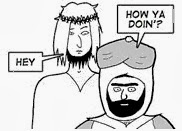From the splendid and entirely unoffensive Jesus and Mo online cartoon site.
Background
Here's Nick Cohen's excellent report of the issue for those unfamiliar with the BBC's recent behaviour. Nick summarizes the key facts thus:
The BBC asked the executive director of the Quilliam Foundation, an anti-extremist thinktank, on to a discussion show. Two atheist members of the audience wore T-shirts showing Jesus saying: "Hey" and Muhammad saying: "How ya doing?" I beg you to keep the innocuous nature of the cartoon at the front of your mind as we descend into a modern Bedlam.
The BBC decided that extreme Wahhabi and Salafi Muslims, who would ban all images of Muhammad, represented all Muslims. It ordered its producers not to show the offending T-shirts. [Liberal Democrat candidate Maajid] Nawaz left the studio in some disgust. He tweeted the cartoon of Jesus saying: "Hey" and Muhammad saying: "How ya doing?" and added: "This is not offensive & I'm sure God is greater than to feel threatened by it."
What Happened Next?
Not only is the BBC is standing by its decision, but it is continuing to censor the relevant image in its reporting on the current furore surrounding the image.
As Ian Katz (@iankatz1000) Editor for BBC Newsnight put it in a recent tweet:
.@VictoriaPeckham a/ cos use of any Mohamd image causes great offence to many (not just extremists) b/ cos no clear journlistic case to use
— Ian Katz (@iankatz1000) January 29, 2014I'm sorry, but the BBC's position here is indefensible.
If I wrote to the BBC to complain that I had been deeply offended by (say) an item on breast feeding, the BBC would (I sincerely hope) write back (albeit using polite language) referring me to the reply given in the case of Arkell v. Pressdram.
If, on the other hand, I wrote to the BBC to complain that I had been deeply offended by (say) an item in which a rabid racist had been given a platform to rant on - unchallenged - about the UK becoming overrun by "niggers, pakis, and yids" , the BBC would (I sincerely hope) write back conceding I might have a point.
In between these two extremes there are huge grey areas and the BBC, quite rightly, pre-emptively exercises its judgement as to what is appropriate to broadcast and what is not appropriate to broadcast.
In exercising such judgement, however, the BBC is also judging not just how likely it is that some people might be offended by whatever the item in question might be but also how reasonable it is for anyone to take offence at that item. (After all, there are many people who are deeply offended by breastfeeding and all manner of other perfectly innocuous topics.)
The cartoon in this case was utterly innocuous and could not give offence to anyone other than a totally unreasonable fanatic. By pussyfooting around such fanatics, the BBC is - in effect - suggesting that their concerns are somehow reasonable. They are not.
I, like Maajid Nawaz, am greatly offended by the BBC's behaviour in this matter. I wonder whether Mr Katz and his colleagues will ever start taking the feelings of those of us with deeply held liberal and rational values into account.
